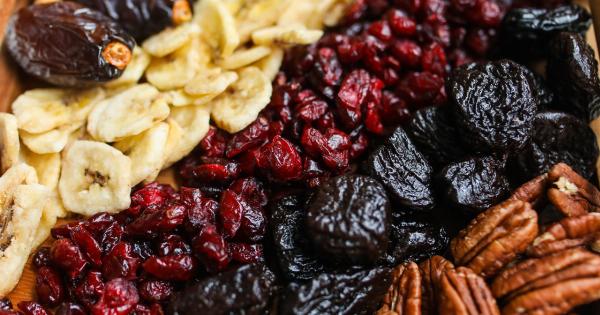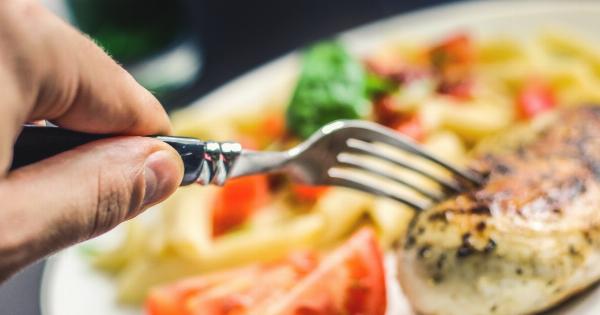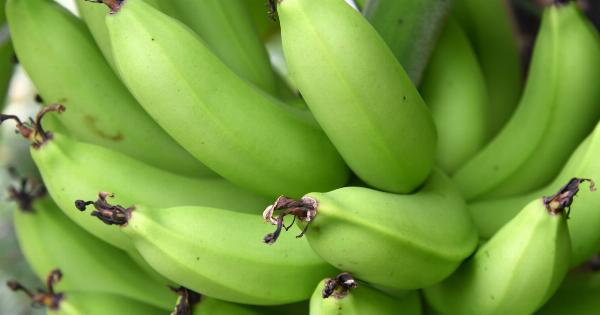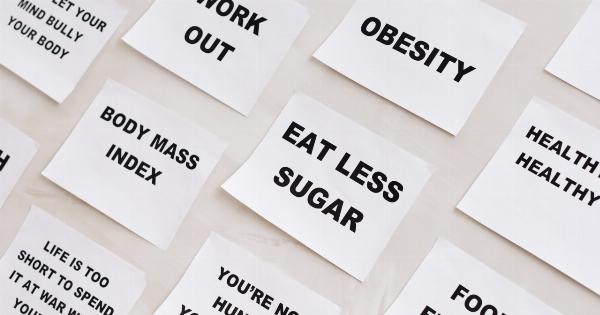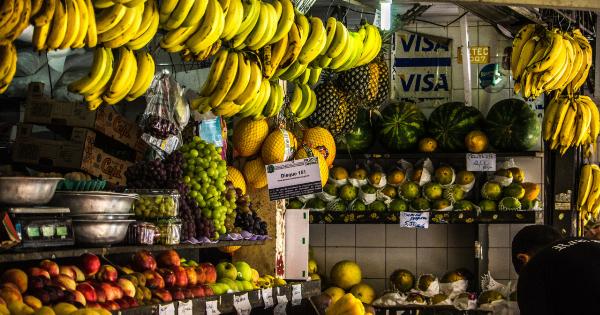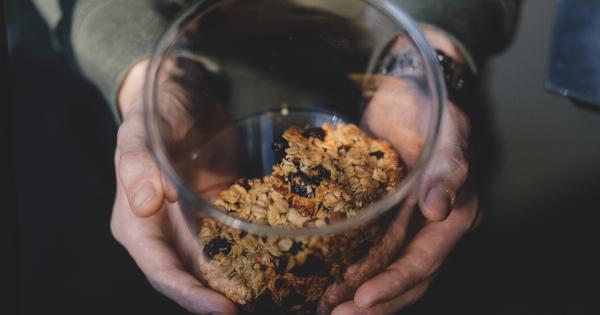Food is a basic human need. It fuels our energy and sustains our bodies. However, some people take it too far and tend to overindulge.
A lot of factors may contribute to this behavior, such as emotional stress, cultural upbringing, social influences, and physiological issues like hormonal imbalances and metabolic disorders.
Overeating can lead to various health problems, such as obesity, heart disease, diabetes, and digestive disorders. It also affects one’s mental and emotional well-being, leading to guilt, anxiety, depression, and low self-esteem.
Here are 30 different titles for “Which Types of People Overwhelm It With Food,” based on various perspectives and contexts:.
1. Emotional Eaters: When Food Becomes A Comfort For Inner Turmoil
Some people use food as a way to cope with their emotions, especially negative ones like sadness, anger, boredom, and anxiety. They may eat even when they’re not hungry or eat specific types of food that trigger pleasure and satisfaction.
This habit can lead to a vicious cycle of emotional eating that hampers their physical and mental health.
2. Binge Eaters: When The Urge To Eat Is Uncontrollable
Binge eating disorder is a recognized mental health condition characterized by recurrent episodes of eating large quantities of food in a short time, often accompanied by a sense of loss of control.
Binge eaters may feel ashamed, guilty, and out of control, and this behavior can lead to weight gain, low self-esteem, and health problems.
3. Compulsive Eaters: When Food Becomes A Fixation And Obsession
Compulsive eating is a subset of obsessive-compulsive disorder (OCD) that revolves around food and eating.
People with this condition may have intrusive thoughts, urges, or compulsions related to food, such as counting calories, checking food labels, or avoiding certain foods. This behavior can disrupt their daily lives and relationships and is often difficult to manage without professional help.
4. Social Eaters: When Food Is The Centerpiece Of Socializing
Some people enjoy eating and drinking with their friends and family, and it’s a part of their social life. They may attend parties, gatherings, or dinners where food is the centerpiece of the event, and they may indulge in various delicacies.
While there’s nothing wrong with enjoying food and good company, social eating can become problematic when it leads to overeating, bingeing, or unhealthy food choices.
5. Comfort Eaters: When Food Provides Nostalgic And Familiarity
Comfort eating is a term used to describe people who eat certain foods for emotional reasons, such as feeling nostalgic, happy, or secure.
These foods are often associated with childhood memories, family gatherings, or personal rituals, and the act of eating them provides a sense of comfort and familiarity. However, comfort eating can become a crutch that hinders one’s ability to deal with emotions and find healthier ways to achieve comfort.
6. Reward Eaters: When Food Is A Reward For Achievements
Some people use food as a way to reward themselves for their accomplishments, such as finishing a project, getting a promotion, or completing a workout.
While this behavior may seem harmless, it can lead to overeating and associating food with self-validation, which can damage one’s self-image and motivation.
7. Perfectionist Eaters: When Food Is A Matter Of Control And Rules
Perfectionist eaters are people who have strict rules about what, when, and how much they eat, often to achieve a certain body weight, shape, or health goal.
They may count calories, track macros, or avoid certain food groups, and they may feel guilty or anxious when they deviate from their plan. While there’s nothing wrong with having healthy eating habits, perfectionist eaters may become obsessive, rigid, and anxious about food, which can affect their social life, mental health, and eating disorders.
8. Impulsive Eaters: When Food Is A Spontaneous And Irresistible Temptation
Impulsive eaters are people who act on their cravings and impulses without considering the consequences. They may buy, eat, or hoard food in a spontaneous and uncontrolled way, often resulting in overeating, bingeing, or food waste.
Impulsive eaters may have a lack of impulse control, self-awareness, and mindfulness, which can lead to various health and social problems.
9. Mindless Eaters: When Food Is An Automated And Unconscious Habit
Mindless eating is a common habit that many people develop, especially in our fast-paced and convenience-driven culture.
It’s a form of automatic eating that occurs when people eat without paying attention to their food, their hunger signals, or their environment. Mindless eaters may eat while watching TV, working, driving, or socializing, and they may consume large quantities of food without realizing it. This habit can lead to overeating, weight gain, and poor digestion.
10. Competitive Eaters: When Food Is A Spectacle And Sport
Competitive eating is a niche sport that involves consuming large quantities of food in a limited amount of time. It’s often used for entertainment, fundraisers, or contests and can attract a large audience.
Competitive eaters may have exceptional eating skills, such as stretching their stomach, controlling their breathing, and eating fast. While it may seem impressive, competitive eating can lead to health risks and promote unhealthy eating habits.
11. Chronic Dieters: When Food Is A Struggle And Obsession
Chronic dieters are people who have a long history of dieting and weight cycling, often associated with body dissatisfaction, low self-esteem, and social pressure.
They may try various diets, supplements, or weight loss programs, often with little success. Chronic dieting can become an obsession that revolves around food, weight, and body image, leading to eating disorders, negative health outcomes, and poor quality of life.
12. Food Addicts: When Food Is A Substance That Triggers Cravings
Food addiction is a controversial concept that proposes that some people may have an addiction to certain types of food, such as sugary, salty, or fatty foods.
The proposed mechanism is similar to drug addiction, where the brain’s reward system is activated by certain foods, leading to cravings, tolerance, and withdrawal symptoms. While the evidence for food addiction is still inconclusive, it’s clear that some people may experience addictive-like behaviors around food, leading to overeating and health problems.
13. Late-Night Eaters: When Food Is A Nighttime Ritual And Snack
Some people have a habit of snacking or eating late at night, often out of boredom, habit, or hunger. Late-night eating can disrupt one’s sleep, digestion, and metabolism, leading to weight gain, acid reflux, and other health problems.
However, some people may find it hard to break this habit, and they may need to find alternative ways to unwind, relax, or satisfy their hunger before bedtime.
14. Stress Eaters: When Food Is A Coping Mechanism For Stressful Situations
Stress eating is a common behavior that many people develop, especially when facing stressful situations, such as exams, deadlines, or conflicts.
Stress can trigger the release of cortisol, a stress hormone that can increase appetite and cravings for comfort food. Stress eating can become a maladaptive coping mechanism that leads to overeating, weight gain, and decreased resilience to stress.
15. Carb Lovers: When Food Is A Passion For Carbohydrates
Carbohydrates are a macronutrient that provides energy to the body and brain. Some people have a particular fondness for carbohydrates, such as bread, pasta, and rice, and they may include them in every meal.
While carbohydrates are essential for health, excessive consumption of refined carbohydrates can lead to blood sugar spikes, weight gain, and other health problems.
16. Sugar Addicts: When Food Is A Sweet Tooth And Craving
Sugar is a type of carbohydrate that provides a quick energy boost to the body. Some people may have a sweet tooth that makes them crave sugary foods, such as candy, cakes, and sodas.
While it’s fine to enjoy sweet treats in moderation, excessive sugar consumption can lead to dental problems, metabolic disorders, and other health problems.
17. Fast Food Fans: When Food Is A Convenient And Tasty Option
Fast food is a type of food that’s designed to be quick, cheap, and tasty. It’s often associated with fast-paced and urban lifestyles and can be a convenient option for people who don’t have time or resources to cook or eat at home.
However, fast food is often high in calories, fat, and sodium, and it can lead to weight gain, heart disease, and other health problems.
18. Foodies: When Food Is A Passion And Art
Foodies are people who have a particular passion for food, often related to its taste, texture, and cultural significance. They may enjoy cooking, trying new restaurants, and talking about food with friends and family.
While being a foodie can be a positive and enjoyable interest, it can also lead to overeating, poor food choices, and social pressure to conform to certain food trends.
19. Vegetarians And Vegans: When Food Is A Lifestyle And Philosophy
Vegetarians and vegans are people who exclude certain animal products from their diets, either for health, ethical, or environmental reasons.
They may have specific food preferences, such as plant-based proteins, whole grains, and vegetables, and may avoid processed or animal-derived products. While being vegetarian or vegan can have health benefits, it’s also important to ensure that one’s diet is balanced and provides all essential nutrients.
20. Gluten-Free Dieters: When Food Is A Health Trend And Necessity
Gluten-free diets are diets that exclude gluten, a protein found in wheat, barley, and rye.
Some people may follow a gluten-free diet due to celiac disease, a genetic autoimmune disorder that damages the small intestine, or non-celiac gluten sensitivity, a less severe condition that causes digestive symptoms. While a gluten-free diet is essential for those with gluten-related disorders, it’s also important to ensure that one’s diet is balanced and provides all essential nutrients.
21. Food Insecurity: When Food Is A Scarcity And Challenge
Food insecurity is a condition that occurs when people lack access to sufficient, safe, and nutritious food due to various economic, social, and environmental factors.
Food insecure people may struggle to afford or find healthy food options, and they may resort to cheaper, less nutritious, or unsafe foods. Food insecurity can lead to malnutrition, health problems, and social isolation.
22. Food Deserts: When Food Is A Geographic Disadvantage
Food deserts are areas where people have limited access to healthy, fresh, and affordable food, often due to a lack of grocery stores or supermarkets.
Food deserts can occur in urban or rural areas and can affect low-income communities, minority populations, and people with disabilities. Food deserts can lead to food insecurity, poor health outcomes, and social inequalities.
23. Food Wasters: When Food Is A Resource To Waste
Food waste refers to the disposal of food that’s still edible or nutritious, often due to overproduction, spoilage, or consumer behavior.
Food waste is a significant global issue that contributes to environmental degradation, greenhouse gas emissions, and social inequalities. Food wasters may fail to plan their meals, store their food properly, or use up the leftovers, leading to unnecessary waste and loss.
24. Foodie Influencers: When Food Is A Brand And Identity
Foodie influencers are people who use social media platforms like Instagram, TikTok, or YouTube to highlight their food experiences and recommendations.
Foodie influencers can have a significant impact on food trends, brand endorsements, and social norms. While being a foodie influencer can be lucrative and empowering, it can also lead to unrealistic standards, pressure to conform, and ethical concerns about sponsored content and misinformation.
25. Mindfulness Eaters: When Food Is A Mind And Body Connection
Mindful eating is a practice that involves paying attention to one’s food, one’s hunger and fullness signals, and one’s senses, such as taste, smell, and texture.
Mindful eaters may enjoy their food more, eat slower, and make healthier choices. Mindful eating can improve one’s relationship with food, reduce stress, and promote overall well-being.
26. Intuitive Eaters: When Food Is A Self-Discovery And Respect
Intuitive eating is a mindset that encourages people to listen to their bodies’ signals, such as hunger, fullness, and satisfaction, and to respond to them without judgment or restriction.
Intuitive eaters may let go of dieting, calorie counting, or food rules, and focus on finding joy, satisfaction, and balance in their food choices. Intuitive eating can improve one’s mental health, self-esteem, and physical health.
27. Mind-Body Syndrome Eaters: When Food Is A Symptom Of A Greater Illness
Mind-Body Syndrome (MBS) is a condition that proposes that some physical symptoms, such as pain, fatigue, and digestive issues, may have a psychological or emotional origin.
MBS eaters may have symptoms related to food, such as gluten intolerance, irritable bowel syndrome, or food allergies, that are triggered or exacerbated by emotional stress and unresolved psychological issues. MBS eating can be a complex and challenging condition that requires an integrative and holistic approach to behavioral and physical health.
28. Food Security Advocates: When Food Is A Human Right
Food security advocates are people who work toward ensuring that everyone has access to sufficient, safe, and nutritious food, and that food systems are sustainable, resilient, and equitable.
Food security advocates may work in various sectors, such as policy, education, research, community organizing, or international development. Food security advocacy can promote social justice, human rights, and public health.
29. Health Conscious Eaters: When Food Is A Means To Maintain Health And Wellness
Health-conscious eaters are people who prioritize their health and well-being through their food choices, often based on scientific evidence, personal values, and cultural traditions.
Health-conscious eaters may follow specific diets, such as Mediterranean, paleo, or DASH, that emphasize whole foods, plant-based foods, and lean proteins. Health-conscious eating can improve one’s physical and mental health, prevent chronic diseases, and enhance quality of life.
30. Mindful Food Consumers: When Food Is A Global Responsibility
Mindful food consumers are people who care about the social and environmental impacts of their food choices and seek to reduce their carbon footprint, support local farmers, and promote ethical and sustainable food systems.
Mindful food consumers may choose organic, fair trade, or locally sourced foods and may reduce their meat consumption or avoid industrialized food products. Mindful food consumption can promote social and environmental justice, reduce food waste, and protect the planet.








